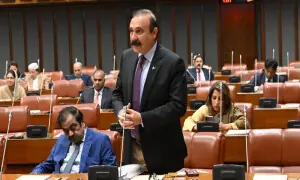Supreme Court seeks to weed out ‘male chaunvinsim’ in divorce cases
4 min readIn a landmark ruling on Wednesday, the Supreme Court overturned an appellate court verdict on the dissolution of marriage by khula, while restoring an earlier verdict of a family court to dissolve the marriage on the basis of cruelty inflicted by the husband.
Tayyeba Ambareen and her daughter had filed the petition challenging the Peshawar High Court’s June 2019 judgment to treat her dissolution on the basis of khula, this making her ineligible for dowr (mahr), dowry, medical expenses and maintenance from her husband.
The family court had passed the judgment in favour of the woman in July 2014, which was overturned by the additional district judge-V in November 2015 after the husband challenged the family court’s verdict citing deprivation of conjugal rights. After converting it into khula, the court ordered the woman to refund five-tola gold to her husband. The decision was later upheld by the high court.
Landmark ruling
A three-judge bench, headed by Justice Sardar Tariq Masood, of the Supreme Court heard the appeal and set aside the impugned judgments of the appleate courts while restorting the verdict in favour of the petitioners.
The verdict noted that while the wife had sought dissolution on the ground of cruelty, the husband claimed conjugal rights ‘despite all his ruthless, tyrannical and oppressive conduct or behavior’. It added that, on the face of it, the claim seemed motivated by the desire not pay the dower, dowry and mainteance amount, in which he succeeded through the appellate court.
“While claiming conjugal rights by a husband in response to the suit for dissolution of marriage, dower, dowry and maintenance, it is also an onerous responsibility of the court to see whether he is sincerely fulfilling his obligations towards his wife, rather than gratifying the urges of male chauvinism,” it noted.
The court also chided the appellate courts while citing the definitions of physical and mental cruelty from Islamic jurisprudence, sayings of the Holy Prophet (PBUH), American and British canons, as well as dictionary definitions of the term cruelty.
It cited from the section on ‘marriage’ in Chapter XIV of “Principles of Muhammadan Law” which states ’that the husband is bound to maintain his wife (unless she is too young for matrimonial intercourse), so long as she is faithful to him and obeys his reasonable orders.
“But he is not bound to maintain a wife who refuses herself to him, or is otherwise disobedient, unless the refusal or disobedience is justified by non-payment of prompt dower, or she leaves the husband’s house on account of his cruelty.”
It added that “where a wife without lawful causes ceases to cohabit with her husband, the husband may sue the wife for restitution of conjugal rights”. The verdict added that such a claim should not be used as “a weapon to defend or obstruct the claim of dower or maintenance allowance, but must be lodged in good faith and with a bona fide intention to reconcile and rectify the issues between the spouses in order to save the matrimonial tie with magnanimity, kindness and through the fulfillment of the husband’s obligations and not as a tool to fight out or frustrate the claim of maintenance allowance or dower amount”.
Instruction to appellate courts
The verdict stated that the purpose of appellate courts is to re-weigh the evidence or make an attempt to judge the credibility of witnesses, but it is the trial court which is in a special position to judge the trustworthiness and credibility of witnesses. “Normally the appellate court gives due deference to the findings based on evidence and does not overturn such findings unless it is on the face of it erroneous or imprecise,” it continued.
It added that it is not the job of the appellate courts to interpret the evidence. Instead, it is to consider the plain meaning and determine what was actually testified and deposed by the parties or their witnesses during evidence. “It cannot pass the appellate judgment on the basis of presumption or speculation.”
It noted that the petitioner had proved her case, while also castigating the Peshawar High Court for endorsing the judgment of the district and sessions court ‘without realizing the fact that the allegations of maltreatment and cruelty were satisfactorily proved by the petitioner No.1 during the trial.’
Divorce in Pakistan
There is a paucity of numbers when it comes to divorce in Pakistan. But the numbers remain low due to a conservative mindset and the perceived social stigma associated with it. In Sindh, official data showed that 5,198 women approached courts seeking dissolution of marriage by way of khula during the pandemic in 2020. Rawalpindi reported 10,312 cases of divorce, khula, maintenance, guardianship in the first eleven months of 2019. The numbers can vary drastically from one year to the next due to under-reporting.
For the latest news, follow us on Twitter @Aaj_Urdu. We are also on Facebook, Instagram and YouTube.





















Comments are closed on this story.